英语人教版九年级全册主动语态与被动语态
Unit 6 语法知识:被动语态 课件-2022-2023学年人教英语九年级全册

五、例题解析
1. A new hospital____D____ in my town next year.
A. builds B. built C. is built D. will be built
解析:主语a new hospital 和谓语动词build为被动关系。 而next year表将来,所以此题考察一般将来时的 被动语态。
20
课堂练习
3.I rode my bike to school yesterday.(改为被动语态) My bike __w_a_s___ _ri_d_d_e_n__ to school by me yesterday.
21
Thanks for listening
22
Beijing National Stadium was built by people. .
9
三、主动句变被动句的步骤
We speak
English.
主动句
主语
2
谓语
3
宾语
1
English bise spoken
(by us).
主语
谓语
宾语
步骤: 1宾变主 2主变宾,前加by
3动变被,看清be, 结构式为be + done
2
一、被动语态的定义
英语中有两种语态:主动语态和被动语态。 在主动语态中,主语是谓语动词的发出者。 在被动语态中,主语是谓语动词的承受者。
被动语态(Passive voice) 被动语态是动词的一种形式,是用于说明主语和谓语之间的关系。 英语语态分为主动语态和被动语态。
People
被动语态 人教版英语九年级全册

6. Three quarters of the world’s books __a_r_e__w_r_i_tt_e_n_ (write) in English.
7. __W__i_ll____ Unit6 __b_e__ta_u_g_h__t _ (teach) next week?
8. This kind of sweater ___se_l_l_s____ (sell)
5. Who bought the sweater? ______________________________________ ____________________________________
不使用by 的被动语态 1. Chongqing is known __fo_r_ its good foods. 2.She is known __a_s___ a successful singer. 3. Those mountains are covered _w__it_h_ snow . 4. Shoes are made _o_f___ leather. 5. Bread is made __fr_o_m_ flour.
2. 连系动词(Link.v.) 如:be, look, seem, feel, sound, smell, taste, get, turn, become…
•Peking Opera __so_u_n_d_s__ (sound) beautiful.
3. 当此动词表示事物的自然属性的时候:
•The pen __w__r_it_es___ (write) very fast. •This kind of sweater ___se_l_ls__ (sell) well.
2022-2023学年人教版英语九年级全册一般现在时被动语态课件

A. is cleaned B.is clean C.cleans
4. Look! Someone ____B______.
A. is danced B. is dancing C.dances
5. I'll be very happy if I B to his birthday party.
主动语态变被动语态
We speak
主语
谓语
English.
宾语
主动语态
English is spoken by us.
主语
谓语
宾语
被动语态
主动语态的宾语变为被动语态的主语;主动语 态的谓语变为“be+及物动词过去分词”结构, 时态不变;主动语态的主语变为介词by的宾 语,主格变宾格,放在谓语之后。
Байду номын сангаас
一. 单项选择。 1. Knives__C___ of metal(金属) and wood.
A. made B.make C.are made
2.more and more foreigners A Chinese in the world now.
A. speak B. are spoken C.spoke
及回答
Yes, it is . / No, it isn't.
特殊疑问句 What is the shirt made of ?
否定式: 主+is/am/are+ not +及物动词过 去分词+其他.
肯定式: 主+is/am/are +及 物动词过去分词+
被动语法知识总结人教版英语九年级全册
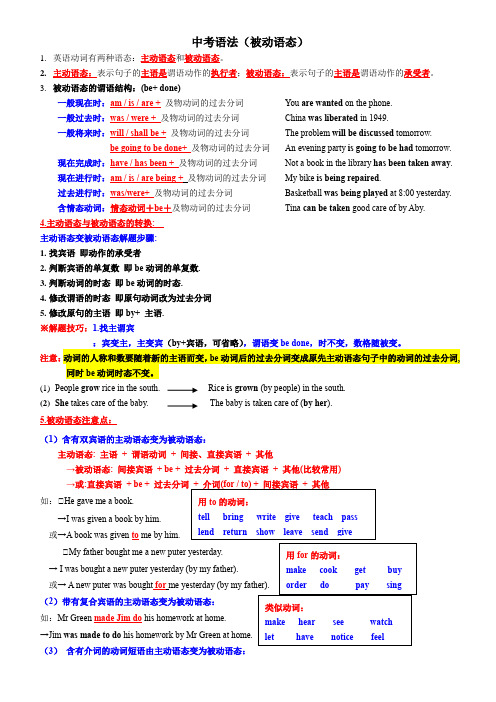
中考语法(被动语态)1. 英语动词有两种语态:主动语态和被动语态。
2. 主动语态:表示句子的主语是谓语动作的执行者;被动语态:表示句子的主语是谓语动作的承受者。
3. 被动语态的谓语结构:(be+ done)一般现在时:am / is / are + 及物动词的过去分词 You are wanted on the phone. 一般过去时:was / were + 及物动词的过去分词 China was liberated in 1949. 一般将来时:will / shall be + 及物动词的过去分词The problem will be discussed tomorrow. be going to be done+ 及物动词的过去分词An evening party is going to be had tomorrow. 现在完成时:have / has been + 及物动词的过去分词 Not a book in the library has been taken away . 现在进行时:am / is / are being + 及物动词的过去分词 My bike is being repaired .过去进行时:was/were+ 及物动词的过去分词Basketball was being played at 8:00 yesterday. 含情态动词:情态动词+be +及物动词的过去分词Tina can be taken good care of by Aby.4.主动语态与被动语态的转换: 主动语态变被动语态解题步骤: 1. 找宾语 即动作的承受者2. 判断宾语的单复数 即be 动词的单复数.3. 判断动词的时态 即be 动词的时态.4. 修改谓语的时态 即原句动词改为过去分词5. 修改原句的主语 即by+ 主语. ※解题技巧:1.找主谓宾:宾变主,主变宾(by+宾语,可省略),谓语变be done ,时不变,数格随被变。
人教版九年级英语人教新课标被动语态课件(共16张PPT)
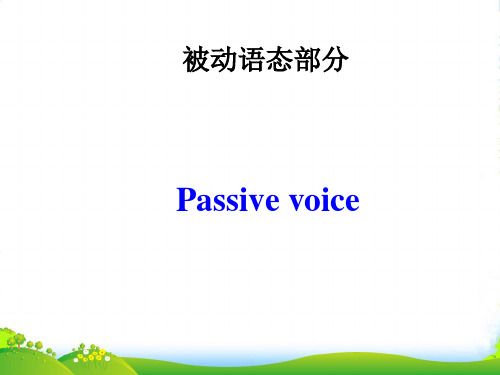
3 一般将来时 will/be going to+动
词原形
4 过去将来时 would+动词原形
被动语态
am/is/are+V过去分词 was/were+V过去分词
will/be going to+be+V过去 分词
would+be+V过去分词
5 现在进行时 am/is/are+现在分词 am/is/are+being+V过去分词
1、Norman Bethune i_s_b__u_ri_e_d (bury) in Hebei. 2、Chinese _i_s_s_p_o__k_e_n_ (speak) in China. 3、The bed ___is__u_s_e_d__ (use) for sleeping. 4、Our classroom _is__c_le_a_n__e_d (clean) every day. 5、The cars _a_r_e__m_a_d_e__ (make) in Beijing.
谢谢观赏
•1、书籍是朋友,虽然没有热情,但是非常忠实。2022年2月12日星期六2022/2/122022/2/122022/2/12 •2、科学的灵感,决不是坐等可以等来的。如果说,科学上的发现有什么偶然的机遇的话,那么这种‘偶然的机遇’只能给那些学有素养的人,给那些善于 独立思考的人,给那些具有锲而不舍的人。2022年2月2022/2/122022/2/122022/2/122/12/2022 •3、书籍—通过心灵观察世界的窗口.住宅里没有书,犹如房间里没有窗户。2022/2/122022/2/12February 12, 2022 •4、享受阅读快乐,提高生活质量。2022/2/122022/2/122022/2/122022/2/12
英语人教新目标九年级全一册人教版九年级Unit5被动语态(共32张PPT)
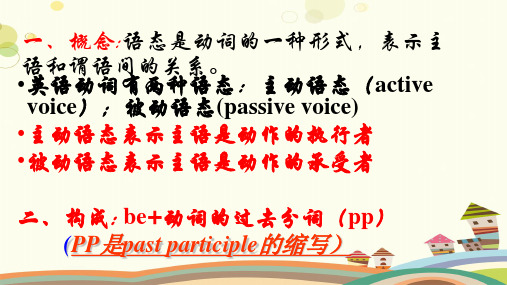
•10.带双宾语的动词可有两种被动语态 ask/ tell/pay /send /give /buy/ show/ offer/ lend /make/ teach/ serve... Eg:She asked him some questions. •He was asked some questions by her. •Some questions were asked him by her. Eg: Mother bought me a new coat . •I was bought a new coat by mother. •A new coat was bought for me by mother.
•eg:I often see him run on the playground.
She often hears someone sing there. He is often seen to run on the playground by mSeo.meone is often heard to sing there by her.
什么时候要用被动语态呢? 在下列三种情况之一要用被动语态: ①不知道动作的执行者是谁,用被动语态。
His bike was stolen last week. ②没有必要指出谁是动作的执行者,用被动语态。 Rice is grown in the south of China. ③需要强调动作的承受者时,用被动语态.
•2. take place/ happen(发生,无被动语态) Eg: Great changesh_a_v_e__t_a_k_e_n_p_l_a(cteake place) in my hometown in the past few years.
九年级英语主动语态和被动语态课件ppt
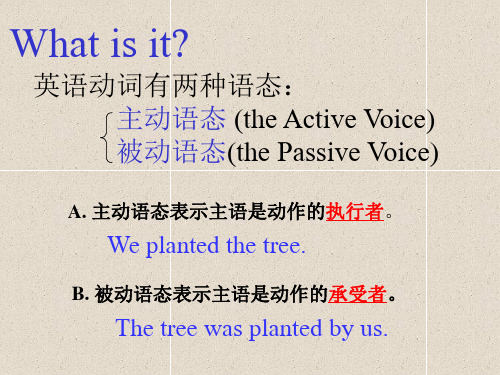
We planted the tree.
B. 被动语态表示主语是动作的承受者。
The tree was planted by us.
经营者提供商品或者服务有欺诈行为 的,应 当按照 消费者 的要求 增加赔 偿其受 到的损 失,增 加赔偿 的金额 为消费 者购买 商品的 价款或 接受服 务的费 用
A birthday party
is going to held by Tom
.
情态动词的被动语态: 经营者提供商品或者服务有欺诈行为的,应当按照消费者的要求增加赔偿其受到的损失,增加赔偿的金额为消费者购买商品的价款或接受服务的费用
must/have to/can等 + be + 过去分词
8. You must throw the broken pottery
典型题例
例1 将下列句子改为被动语态。 We clean our classroom every day.
Our classroom is cleaned (by us) every day.
在改写中应注意:
1.把原来的宾语提到前面作被动语态的主语; 2.把动词变成“be + 过去分词”; 3.主动语态中的主语变为介词by的宾语。
We speak
主语
谓语
English.
宾语
主动语态
English is spoken by us.
主语
谓语
宾语
被动语态
当主语是动作的执行者时,动词用主动语态 经营者提供商品或者服务有欺诈行为的,应当按照消费者的要求增加赔偿其受到的损失,增加赔偿的金额为消费者购买商品的价款或接受服务的费用 (Active Voice);如果主语是动作的承受者, 动词便用被动语态(Passive Voice)。
被动语态讲解及练习 人教版新目标英语九年级
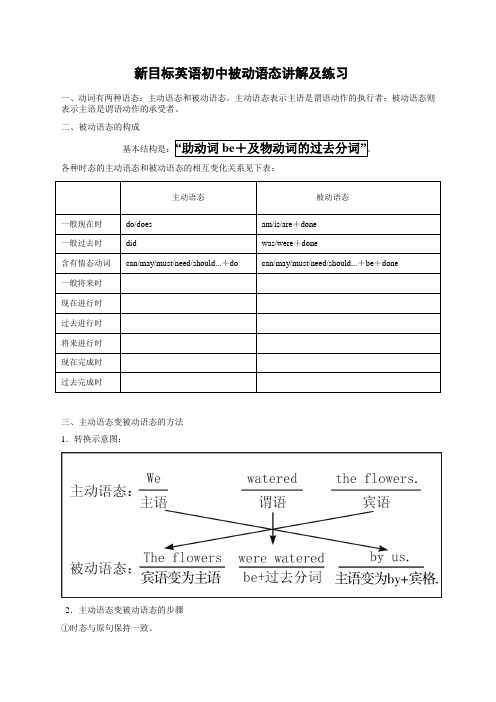
新目标英语初中被动语态讲解及练习一、动词有两种语态:主动语态和被动语态。
主动语态表示主语是谓语动作的执行者;被动语态则表示主语是谓语动作的承受者。
二、被动语态的构成基本结构是:“助动词be+及物动词的过去分词”。
各种时态的主动语态和被动语态的相互变化关系见下表:主动语态被动语态一般现在时do/does am/is/are+done一般过去时did was/were+done含有情态动词can/may/must/need/should...+do can/may/must/need/should...+be+done一般将来时现在进行时过去进行时将来进行时现在完成时过去完成时三、主动语态变被动语态的方法1.转换示意图:2.主动语态变被动语态的步骤①时态与原句保持一致。
②把主动语态的宾语变为被动语态的主语(如果是人称代词,要将宾格变为主格)。
③把谓语变成被动结构“be+过去分词”结构(要注意原句的时态和主语的单复数)。
④把主动语态中的主语改为by构成的介词短语,放在谓语动词之后(by短语有时可省略)。
如:We clean the classroom every day. 我们天天打扫教室。
→The classroom is cleaned (by us) every day. 教室天天(被我们)打扫。
We must send the girl to the hospital at once. 我们必须马上把这女孩送到医院。
→The girl must be sent to the hospital at once (by us). 这女孩必须马上(被我们)送到医院。
四、被动语态的用法1.不知道谁是动作的执行者时。
如:Some new computers were stolen last night. 一些新电脑在昨晚被盗了。
(不知道是谁偷的) 2.没有必要指出谁是动作的执行者时。
如:Books mustn’t be taken out of the library.书不准被带出图书馆。
- 1、下载文档前请自行甄别文档内容的完整性,平台不提供额外的编辑、内容补充、找答案等附加服务。
- 2、"仅部分预览"的文档,不可在线预览部分如存在完整性等问题,可反馈申请退款(可完整预览的文档不适用该条件!)。
- 3、如文档侵犯您的权益,请联系客服反馈,我们会尽快为您处理(人工客服工作时间:9:00-18:30)。
主动语态与被动语态
一.概念:主动语态表示主语是动作的执行者,被动语态表示主语是动作的承受者。
●二.被动语态的构成:助动词be+及物动词的过去分词
●三.被动语态的时态:以为work 例:
●1. 一般现在时: am / is/are+ worked
●2. 一般过去时: was / were+ worked●3. 一般将来时: shall / will +be+ worked
●4. 过去将来时: should / would+ worked
●5. 现在进行时: am /is/are+ being+ worked
●6. 过去进行时: was /were+ being+ worked
7. 过去进行时: was/were +being +worked
8. 现在完成时: have/has+ been+ worked
9. 过去完成时: had +been+ worked
10. 将来完成时: shall/ will +have been +worked
11. 过去将来完成时: should/would +have been+ worked
12. 情态动词(can/may/must/should etc.)+be+动词的过去分词
●四. 用法:
●当我们不知道谁是动作的执行者或者没有必要指出
谁是动作的执行者时或者只需强调动作的承受者时,要用被动语态。
五. 方法:
●Many people speak English.(主动语态)
●English is spoken by many people.(被动语态)六. 注意以下问题:
● A. 带有双宾语的动词变为被动语态时,可以把其中一个宾语变为被动语态的主语,若将直接宾语(sth.)变为主语,须根据习惯在原间接宾语前加上介词to或for
用to的常见词有:give, show, send, lend, pass, pay, teach, throw, take, bring etc.
用for的常见词有:make, choose, sing, play, draw, save, buy, get, leave, cook etc.
●eg.
●1. Mary gave him some books.
●He was given some books by Mary.
●Some books were given to him by Mary.
●2. Her father bought her a new bike.
●She was bought a new bike by her father.
● A new bike was bought for her by her father.
●B.带复合宾语(宾语+宾语补足语)的动词变为被动语态时,只能将宾语变为被动语态的主语,宾语补足语不可变为主语。
●eg. 1. We call him Gina.
●He is called Gina (by us).
● 2. They made me happy.
●I was made happy( by them).
● 3. He asked me to come here.
●I was asked to come here (by him)●C. 在see, let, make, hear, watch etc.动词之后,作宾语补足语的动词不定式不带to,但在变为被动语态时,则一定要加上to。
●eg.
●1. We saw them play football just now.
●They were seen to play football just now.
2. We often hear her sing in English.
●She is often heard to sing in English.
●D. 在某些“不及物动词+介词/副词”(相当于及物物动词)的句子中,变被动语态时,注意不要丢掉介词/副词。
eg.
●1. People often talk about that film.
●That film is often talked about.
●2. We should speak to the old people politely.
●The old people should be spoken to politely.
E. 主动形式表示被动意义的词:
●1)某些感官动词:
●look, smell, taste , feel, wear ,sound, etc.
●2)某些及物动词+副词:
● wash, write, sell, read, open, cut, shut, keep,
●etc.
● 1. This coat feels soft.
● 2. The pen writes smoothly.
● 3. That book sells well.
● 4. This kind of shirt washes easily.
●F. 只有及物动词(vt.)才有被动语态,不及物动词(vi.)没有被动语态,因为它不带宾语。
●eg. happen
●What was happened? ×
●What has happened? √●What is happening? √●G. 若主动句的主语是表示地点的名词,变为被动语态时,应将其变为in+名词,作地点状语,而不变为by的宾语。
●eg. Our village opened a new school last year.
● A new school was opened in our village last year.
●H. 若主动句的谓语动词是know变为被动语态时,应将其变为be known to,而不能变为be known by。
● eg. People all over the world know the Great Wall.
●The Great Wall is known to people all over the world.
●I. 若主动句的主语是nobody, no one等否定不定代词时,变为被动语态应将其anybody, anyone作介词by的宾语,并将其谓语动词改为否定的被动语态。
● eg. Nobody can answer this question.
●This question can not be answered by anybody.
一.句型转换 1. A large number of people speak French in Paris.
●French ____ ______ ____a large number of people in Paris.
2. My cousin repaired the broken watch.
●The broken watch ____ _____ _____my cousin.
●3. We should plant the trees around the lake.
●The trees _____ _____ ______around the lake.
●4. My aunt gave me a present on my birthday.
●I ____ _____a present by my aunt on my
birthday.
A present _____ ____ _____me by my aunt on my birthday.。
